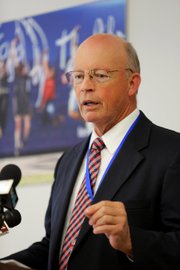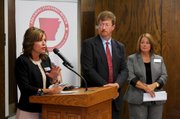A state panel on Friday approved a three-school expansion of the eSTEM Public Charter School system and conditionally approved a new LISA Academy elementary school, creating a potential 3,000 more charter seats within the Little Rock School District.
The LISA Academy plan for a 600-pupil charter school at 12200 Westhaven Drive is contingent on the charter system securing a building that is now occupied by ITT Technical Institute and is the subject of a lawsuit.
Also Friday, the Charter Authorizing Panel -- which consists of top-level staff members at the Arkansas Department of Education -- voted to deny a kindergarten-through-fourth-grade expansion to Quest Middle School of Pine Bluff.
It also approved an address change for the new Future School of Fort Smith and approved a rearranging of grade levels and locations at KIPP: Delta Charter Schools, Blytheville.
Proposals by Quest Middle School of West Little Rock for a new school on Hardin Road and Haas Hall Academy Charter School proposal for a school in Springdale were withdrawn from consideration Friday. Planners for the Springdale school plan to revise its proposal and submit it to the panel later this spring, in time to open to students in August if it is ultimately approved.
The Charter Authorizing Panel votes taken Friday are now subject to a final review by the state Board of Education, which could occur as soon as next month.
The Education Board can either accept the panel votes or conduct its own hearings at a later date before making final decisions on the eSTEM and LISA Academy plans, which have generated concerns and objections from some individuals or groups with ties to the Little Rock School District.
"It's a great day for the students and the families that we hope to serve as we expand," John Bacon, chief executive officer of eSTEM Public Charter Schools Inc., said after the charter system's two-hour presentation -- including questions and answers -- to the panel and the panel's 7-1 vote in support of the eSTEM proposals.
Bacon has said that the proposed expansion is largely a response to the high demand for the schools. He told the panel that 6,410 students submitted applications by Feb. 1 to enroll in what is now a 1,462-student eSTEM system school for the 2016-17 school year.
The plans for three new eSTEM schools -- which are in the form of an amendment to eSTEM's existing state-issued charter -- call for moving eSTEM Public Charter High School grades 10 through 12 from the current downtown location to the renovated and expanded Larson Hall at the University of Arkansas at Little Rock. That move, which would occur in the 2017-18 school year, is intended to enable high school students to take some college-level classes and earn associate degrees.
One of eSTEM's two existing campuses at Third and Louisiana streets would become a kindergarten-through-sixth- grade elementary and the other -- now a high school -- would become a seventh-through-ninth-grade junior high.
In the following 2018-19 school year, a second kindergarten-through-sixth-grade elementary school and a second seventh-through-ninth junior high would be opened at 400 Shall St. That is east of Interstate 30, near the Heifer Project International headquarters and at the end of a Rock Region Metro trolley line.
The state-authorized enrollment cap for the eSTEM system would grow over the course of a few years from the current 1,462 to 3,844 in kindergarten through 12th grades.
In his presentation, Bacon described the accomplishments of the 8-year-old eSTEM system, including the awards received by students, student athletes and teachers. The school has graduated 436 students in four years who accepted $15 million in scholarships, an average of more than $34,000 per student.
The school has started an innovative student entrepreneur program, provided its teachers with financial awards based on student performance, operated an extended school year and school day, and has begun developing its own teachers with a residency program for people with degrees in science, technology, math and engineering fields.
In regard to student achievement, Bacon said he was not pleased with the eSTEM results on Partnership for Assessment of Readiness for College and Careers exams, commonly called PARCC exams, which were about the same as results in the Little Rock, North Little Rock and Pulaski County Special districts. That performance on the one-year-only test was in contrast to eSTEM's much better performance on the older Benchmark and End of Course exams, he said.
"We killed it, " he said about those earlier tests.
Baker Kurrus, the state-appointed superintendent of the Little Rock School District, as well as members of the district's Citizens Advisory Committee and the League of Women Voters of Pulaski County had expressed in recent letters to the panel their concerns or objections to the addition of new eSTEM and LISA Academy campuses.
The Public Education Foundation of Little Rock submitted a letter to the panel Friday and Sen. Joyce Elliott, D-Little Rock, and Cathy Koehler, president of the Little Rock Education Association employees union, addressed the panel -- all asking that nothing be done by state officials to undermine the state-controlled district's efforts to improve in some areas and preserve its successes in other areas.
The state took over the district, removed its School Board and placed the superintendent under the direction of the state education commissioner because six of the district's 48 schools are labeled by the state as academically distressed.
Kurrus said there are 13 charter schools within the district's boundaries and that eSTEM and LISA are already larger than almost 180 of the state's 232 traditional school districts.
If the schools become larger and continue to attract the types of students they have attracted historically, the Little Rock district will be left with greater concentrations of poor and special-education students and fewer resources to educate them to a level of proficiency on state tests, he said. That will make it more difficult for the district to exit state control, he said in his letter.
Bacon told the panel that eSTEM has not had a big impact on the district. The eSTEM schools attracted 298 white students from the district that has 1,700 fewer white students than it did when eSTEM started in 2008. The district has lost 2,700 black students in that time and 407 of them are at eSTEM.
The state panel members called their votes on new charter schools "agonizing" and the "toughest" made to date in their Education Department work.
The panel members struggled the most with the differences in the percentages of poor and special-education students served by the two charter school systems in comparison with students served by the state-controlled Little Rock School District.
About 74 percent of the Little Rock district's students are from low-income families and 11.7 percent are special-education students. About 32 percent of eSTEM's enrollment qualifies for subsidized schools meals because of low family income, as do about 41 percent of the LISA Academy students. Just over 7 percent of eSTEM students and 6.5 percent of LISA Academy students receive special-education services.
Eric Saunders, assistant commissioner for research and technology and a panel member, said the eSTEM decision was one of the toughest he has had to make at the department.
He attempted to make a motion that would condition the approval of the new schools on yearly increases in the percentages of low-income students served by the system.
However, he had to withdraw the proposal because the random lottery system that is legally required for selecting charter school students doesn't allow a charter school to choose its students based on family income or other characteristics.
Saunders expressed similar concerns regarding the access low-income families have to the LISA Academy system.
"I feel responsible for every student in the state, and I want to make sure every student has an opportunity. I think y'all have some very good scores. I commend you on that. And I want all students to have the opportunity to do it, and I want to make sure that nothing stands in the way. I'm concerned about how to continue to close that gap, just in the percentage of students that come."
LISA Academy-West Middle School Principal LuAnne Baroni said the school's officials don't plan to pull students from west Little Rock alone. Officials are working on getting students who currently live in southwest Little Rock, she said, adding that the new location is conveniently situated off Interstates 630 and 430. The school system also has an agreement with Rock Region Metro allowing students to ride the bus system for free, she said.
Stacy Smith, the Education Department's interim assistant commissioner for learning services, made the motion to approve the eSTEM plan for three new campuses.
Ivy Pfeffer, assistant commissioner for human resources, seconded the motion, saying she had thought about the matter since the application was submitted.
"It is really agonizing, and I know it is a very emotionally charged issue and -- thinking about the Little Rock School District -- we want the Little Rock School District to be successful," Pfeffer said.
She said the phasing in of the new schools will give the Little Rock district, as it is getting a foothold, to think about innovations and partnerships.
Annette Barnes, assistant commissioner for accountability, cast the only no votes on both the eSTEM and LISA Academy plans.
"I am at a loss in this situation, the complexity of issues involved in this request are too far-reaching with unknown and unintended potential consequences for me to make a decision at this time," she said in regard to her vote on the eSTEM expansion and made a similar statement about her vote on the LISA Academy.
In an interview, she elaborated, saying that politics of education get in the way of education.
"Until I can in good conscience make a decision with that many ramifications ... I'l have to vote no," she said. "I would have abstained. I do think the school is doing a good job in education, but I also feel that if I put out the light everywhere else, then, yes, this candle will shine much brighter. But it would also take up the opportunity for the other candles to shine."
The LISA Academy is seeking to establish an elementary school in the Westhaven Drive building that used to house a movie theater on a loop between Bowman Road and Chenal Parkway.
The building is owned by Dallas-based AP Consolidated Theaters II Limited Partnership and is leased to ITT, a for-profit college that runs ITT Technical Institute. ITT has leased the space since June 1, 2011, for a five-year term, expiring May 31, according to court documents.
ITT alleged it drafted a new lease agreement, asking to rent just half the space. The owner, who was once receptive to the new deal, later backed out, telling ITT to vacate the facility, court documents show. ITT then learned the owner already had a lease in place with LISA Academy but is asking a federal judge to force the owner to adhere to the contract with ITT.
AP Consolidated Theaters II Limited Partnership owners have asked the judge to dismiss the suit.
LISA Academy is not a party to the suit and believes it has an enforceable lease with the property's owner, said the charter school's attorney, Bonnie Johnson.
If the LISA system is able to rent the property, the charter-school system will open an elementary school there. It will be the second elementary school in the charter system, with the other in Sherwood.
The school would serve kindergarten through sixth grade, while the system's current west location at 21 Corporate Hill Drive would serve seventh through 12th grades.
In reconfiguring the grades, LISA Academy officials are hoping to create a sixth-grade academy to help those students transition to moving from class to class, lockers and college preparatory academics, Baroni said.
That transition also will allow the high school to offer "a broader high school experience," including more Advanced Placement courses, elective course offerings and sports, she said.
Friday's approval also allows the LISA system to raise its enrollment cap from 1,500 to 2,100 students. The enrollment bump will affect only its west campus, Baroni said.
If the LISA system cannot rent the building, it would have to come before the panel again when it acquires a new site, and Friday's approval of the amendments to its current charter also will fall through.
The system will notify parents by June 1 whether the new school will open in the 2016-17 or 2017-18 school year.
Information for this article was contributed by Brenda Bernet of the Northwest Arkanas Democrat-Gazette.
A Section on 02/20/2016




